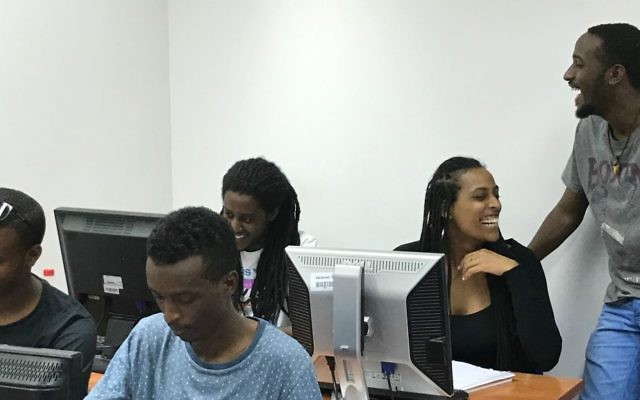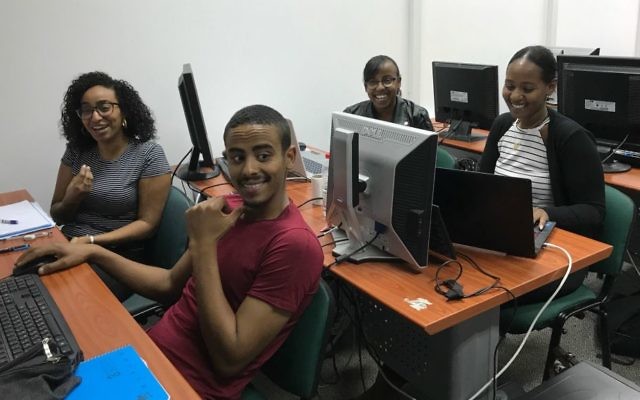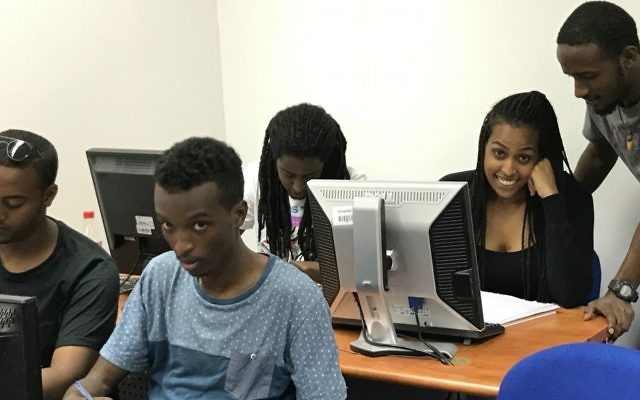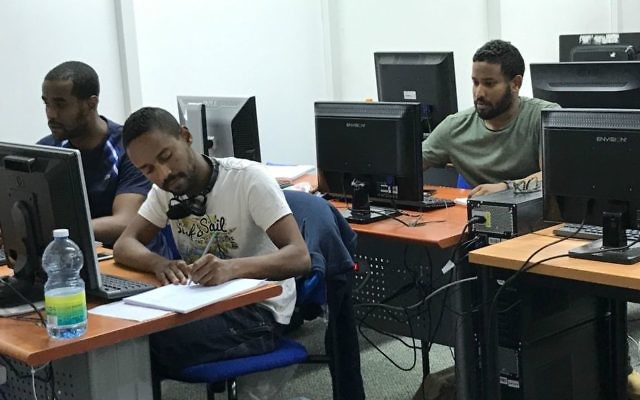“I did my army service without really knowing anything about computers,” said David. “Only before my release did I realize there was something called computer sciences. I am here because I have an aim. There are not many people from the Ethiopian community in high-tech, but I see that graduates from the course manage to get jobs in the sector. And that is what I want too.”
Tech-Career was set up in 2002 by Asher Elias, an Ethiopian social and high-tech entrepreneur who aims to help young Ethiopians fully integrate into Israeli society by arming them with professional skills to qualify for well-paying jobs in the high-tech industries. When he founded his NGO, only four Ethiopian-Israelis were employed in the high-tech industry, and all of them had been trained in Ethiopia.
Nevertheless, there were still significant gaps between Israelis of Ethiopian background and others. About 21% of Ethiopian Israelis educated in Israel are in the top levels of the labor market, as compared to about 40% among the rest of the Jewish population, and about 60% are employed in occupations for low-skilled or unskilled workers, compared to 41% among the rest of the Jewish population (among first-generation immigrants, both those metrics were far lower). Ethiopian-Israelis make up some 145,000 people, or 2% of the total population.
At school, Ethiopians often don’t get the tutoring and encouragement they need to access higher levels of math and science studies, and a “cultural bias” in the pre-army recruitment tests — which are geared toward the wider population and not necessarily to the Ethiopian culture — pushes them to enroll in combat units and not in elite intelligence units, from which many of Israel’s tech entrepreneurs originate.
Tech-Career runs five professional courses each year, each six to eight months long. The students are required to live in dormitories, disconnecting from their daily occupations, families and financial worries; they get a stipend from the National Insurance and Tech-Career helps students who need added financing. They immerse themselves in their studies and have access to computer laboratories around the clock. They receive individualized guidance and tutoring, and take international certification tests in programming — like the Cisco Certified Network Professional certification — at the conclusion of the program.
In addition to their technological studies, participants invest some 200 hours in mastering soft business skills as well, like how to write a CV, how to prepare for a job interview, how to manage time and how to work in a team.
“I am now at the stage of preparing for my interviews,” David said. “I am learning to present myself in the best possible way.”

Teasing and joking with each other during Tech-Career’s classes (Shoshanna Solomon/TimesofIsrael)
In the classes the students, men and women, laugh and tease each other — they are back at school, but with a clear mission in mind: to succeed.
“We are very strict with our students,” said Doron Toren Shamia, who’s in charge of helping place the students at tech firms after they graduate. “Our aim is to give them professional certificates that will allow them to work in the hottest areas of technology.”
During the course, students also get one-on-one mentoring from volunteer high-tech executives and former graduates to familiarize them with the high-tech work culture, introduce them to their social network, prepare them for job interviews, and facilitate their integration into the high-tech workforce.
Toren Shamia has developed a network of companies and mentors she is in touch with, including cybersecurity firm Check Point Software Technologies Ltd., HP, Nice Systems, Wix.com and Raphael Advanced Defense Systems, to help them overcome the entry barrier to the exclusive army-buddy tech scene.

Tech-Career students seek access to Israel’s startup scene (Shoshanna Solomon/Times of Israel)
“We don’t want any special treatment,” she said. The mentors who work with Tech Career help students get the interview, but then the playing field is equal and if they get the job it is their own doing. “We don’t give them the fish, but we give them the fishing tools.”
When he is not studying, David volunteers in a school helping Ethiopian children with their homework, and he goes to an agricultural garden once a week, working with elderly Ethiopians who tend to spices and plants they used to grow in Ethiopia.
“Part of our program is to also make sure the students learn to give back to their community,” said 49-year old Naphtali Avraham, the CEO of Tech-Career, who has led the nonprofit for the past 2.5 years. At the age of 13 Avraham left his family and walked through Sudan to reach Israel with a group of nine children of similar ages.

Tech-Career’s CEO Naphtali Avraham (Shoshanna Solomon/TimesofIsrael)
“You cannot develop without being proud of your roots,” said Avraham, who was an officer in the Israeli Air Force for over 20 years. “You can only tap into your strength if you know your history and the efforts your parents made to come here and the difficulties they faced.”
Tech-Career helps its students realize they have the ability and talents to work in all fields, he said, “knowing they can overcome all barriers.”





